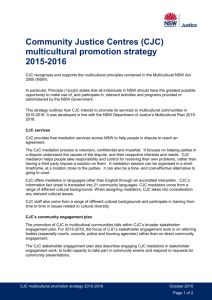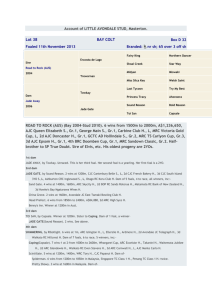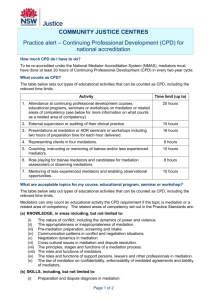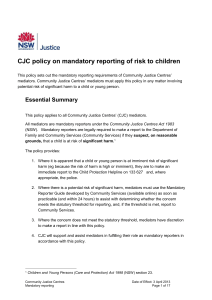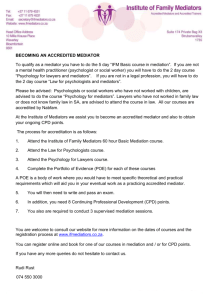Mediators` Code of Conduct - Community Justice Centres
advertisement
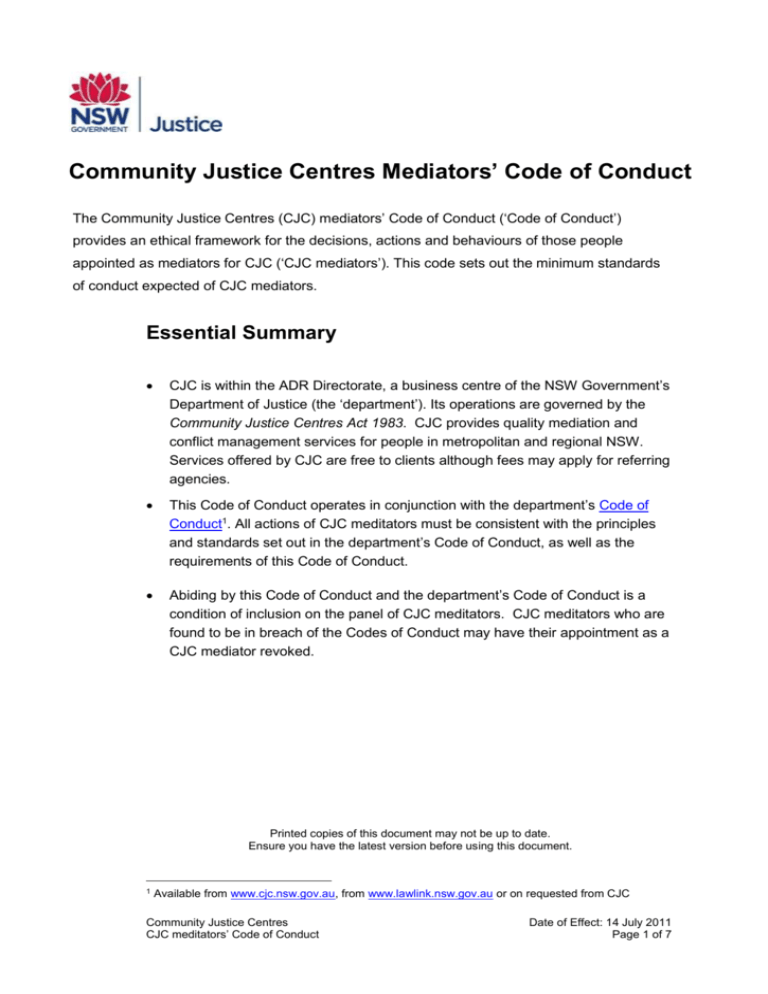
Community Justice Centres Mediators’ Code of Conduct The Community Justice Centres (CJC) mediators’ Code of Conduct (‘Code of Conduct’) provides an ethical framework for the decisions, actions and behaviours of those people appointed as mediators for CJC (‘CJC mediators’). This code sets out the minimum standards of conduct expected of CJC mediators. Essential Summary CJC is within the ADR Directorate, a business centre of the NSW Government’s Department of Justice (the ‘department’). Its operations are governed by the Community Justice Centres Act 1983. CJC provides quality mediation and conflict management services for people in metropolitan and regional NSW. Services offered by CJC are free to clients although fees may apply for referring agencies. This Code of Conduct operates in conjunction with the department’s Code of Conduct1. All actions of CJC meditators must be consistent with the principles and standards set out in the department’s Code of Conduct, as well as the requirements of this Code of Conduct. Abiding by this Code of Conduct and the department’s Code of Conduct is a condition of inclusion on the panel of CJC meditators. CJC meditators who are found to be in breach of the Codes of Conduct may have their appointment as a CJC mediator revoked. Printed copies of this document may not be up to date. Ensure you have the latest version before using this document. 1 Available from www.cjc.nsw.gov.au, from www.lawlink.nsw.gov.au or on requested from CJC Community Justice Centres CJC meditators’ Code of Conduct Date of Effect: 14 July 2011 Page 1 of 7 Table of Contents 1 Scope 3 2 Purpose 3 3 Definitions 3 4 Practice Standards 4 5 Responsibility to other CJC meditators 4 6 Responsibility to CJC and CJC staff 4 7 Other responsibilities of CJC meditators 5 8 Breaches 6 9 References 6 10 Document information 7 11 Document history 7 Community Justice Centres CJC meditators’ Code of Conduct Date of Effect: 14 July 2011 Page 2 of 7 1 Scope This Code of Conduct provides a detailed description of the ethical responsibilities and duties of CJC mediators. This policy forms part of a group of documents concerning CJC meditators. Other relevant documents include: the CJC Mediator Engagement Policy, the Practice Standards and Approval Standards under the National Mediator Accreditation System, the CJC Meditators’ Manual, Handling Complaints and Feedback in Community Justice Centres, and the NSW Community Justice Centres Act 1983. 2 Purpose This Code of Conduct outlines the standard of conduct required of its mediators by CJC and outlines the responsibility of CJC and its mediators to achieve a workplace where ethics are maintained. All CJC meditators are required to adhere to the Code of Conduct. CJC meditators who are found to be in breach of the Codes of Conduct may have their appointment as a mediator revoked. This Code of Conduct is not designed to override or supersede any laws that prescribe responsibilities of mediators. For example, CJC meditators are governed by the legislative requirements of the Community Justice Centres Act 1983. 3 Definitions CJC means Community Justice Centres, which forms part of the ADR Directorate, a business centre of the Department of Justice. CJC meditator means a person appointed as a mediator for CJC under the Community Justice Centres Act 1983 and pursuant to the CJC Meditator Engagement Policy. CJC staff means every employee of CJC and the ADR Directorate including, but not limited to, the director, practice manager, team leaders, mediation advisors, , project officer, administration assistants, clerical officer. Party means any user, client or customer of CJC. Workplace means any place at which a CJC meditator or CJC staff works or otherwise attends in connection with carrying out duties as a CJC meditator or CJC staff member. The department means the Department of Justice. The National Mediator Accreditation System (NMAS) means the industry based scheme established on 1 January 2008 for providing National Accreditation to mediators. A mediation industry body called the National Mediator Standards Board is administering it. The NMAS incorporates National Standards – the Approval Standards and the Practice Standards. Community Justice Centres CJC meditators’ Code of Conduct Date of Effect: 14 July 2011 Page 3 of 7 4 Practice Standards CJC meditators must comply with the Practice Standards under the National Mediator Accreditation System (attached at Annexure A). In addition, CJC meditators must keep up to date with the policies and procedures which are relevant to a CJC mediator’s position, including but not limited to reading any Practice Alerts, Fact Sheets, emails and/or newsletters sent by CJC and/or available on CJC internet site. 5 Responsibility to other CJC mediators CJC meditators work as a team. CJC meditators are expected to work effectively and cooperatively with their co-mediators. CJC meditators should consult with each other when preparing for a mediation session about the roles each will perform by considering what is in the best interests of the parties. CJC meditators must take reasonable care for their own safety and that of other CJC meditators, including taking adequate breaks. CJC meditators must avoid any criticism of their co-mediators in front of parties during a mediation session. If a CJC meditator wishes to discuss the mediation process or a co-mediator’s conduct during a mediation session, a break can be called to allow for private discussions. Parties are not to be left in the mediation room alone. They are to be seated in separate areas outside the mediation room while private discussion between the mediators is taking place. CJC meditators must give open and honest feedback to co-mediators during debriefing or at supervision sessions arranged specifically for that purpose. When giving feedback, and at all times, CJC meditators must treat each other with respect, dignity, courtesy and fairness. CJC meditators must give open and honest feedback about their co-mediators to CJC staff, including in the debrief and when otherwise requested to do so (for example if a complaint has been made and an investigation is on foot). 6 Responsibility to CJC and CJC staff CJC meditators are expected to work effectively and cooperatively with CJC staff. In this regard CJC meditators must: Communicate with all CJC staff in a respectful, professional and timely manner. Comply with directions given by the CJC Director and other CJC staff. Community Justice Centres CJC meditators’ Code of Conduct Date of Effect: 14 July 2011 Page 4 of 7 Keep their own accurate, contemporaneous and complete records, such as the time the mediation begins and ends, travel times, details of training completed, details of pre-mediations, facilitations and any other conflict management services provided. Personally provide accurate and complete information to CJC to enable CJC to comply with reporting, auditing and occupational health and safety requirements, including accurate and complete mediation debriefing forms and claims for payment. These must be provided in a timely manner. Cooperate as far as is necessary to enable compliance with any requirement under the Occupational Health & Safety Act or Regulation that is imposed in the interest of health, safety and welfare. Note: If CJC meditators should mediate for organisations other than CJC they must: 7 ○ not represent themselves as CJC meditators while working in a private arrangement; and ○ understand that they are not covered by the privileges and indemnities set out under the Community Justice Centres Act 1983, nor the department’s insurance policy, when conducting mediations outside CJC. Other responsibilities of CJC mediators In addition to the above, and in accordance with CJC high ethical and professional values, CJC meditators are required to: 1. Act within and uphold the law, including complying with the Community Justice Centres Act 1983 and Mandatory Reporting responsibilities. 2. Act honestly, impartially and without discrimination by treating everyone with respect, courtesy and fairness. 3. Act ethically and professionally and maintain integrity. 4. Exercise diligence, care and attention. 5. Not use offensive or obscene language. 6. While on duty, not consume alcohol to excess, not abuse prescription drugs and not use any form of illegal drugs or substances. 7. Present in appropriate attire that reflects public expectation and community standards for each work location. 8. Not abuse one’s official position or connection with the department by making use of that official position or connection for personal gain. 9. Report through appropriate channels any instance of suspected improper conduct. Community Justice Centres CJC meditators’ Code of Conduct Date of Effect: 14 July 2011 Page 5 of 7 8 Breaches of the mediators’ Code of Conduct and other policies and standards Please refer to “Handling Complaints and Feedback in Community Justice Centres”. 9 References The following policies of the department: Code of Conduct Corruption Prevention Strategy The following policies of CJC: Mediator Engagement Policy Mediators’ Manual Handling Complaints and Feedback in Community Justice Centres The following National Standards under the National Mediator Accreditation System: The Approval Standards The Practice Standards The following NSW legislation: Anti-Discrimination Act 1977 Community Justice Centres Act 1983 Crimes Act 1900 Government Information (Public Access) Act 2009 Independent Commission Against Corruption Act 1988 Industrial Relations Act 1996 Ombudsman Act 1974 Privacy and Personal Information Protection Act 1998 Public Finance and Audit Act 1983 State Records Act 1998 Work Health and Safety Act 2011 Community Justice Centres CJC meditators’ Code of Conduct Date of Effect: 14 July 2011 Page 6 of 7 10 Document information Table 1 Document information Title: Business Centre: Community Justice Centres Mediators’ Code of Conduct ADR Directorate & Community Justice Centres Author: Approver: Date of Effect: Natasha Mann – Director 14 July 2011 Next Review Date: 11 Document history Table 2 Document history Version 1.1 Date Reason for Amendment Jan 2015 Updated for accessibility. Community Justice Centres CJC meditators’ Code of Conduct Date of Effect: 14 July 2011 Page 7 of 7


